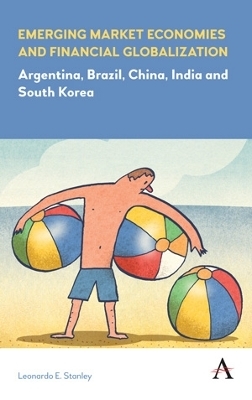
Emerging Market Economies and Financial Globalization
Anthem Press (Verlag)
978-1-78308-674-0 (ISBN)
In the past, foreign shocks arrived to national economies mainly through trade channels, and transmissions of such shocks took time to come into effect. However, after capital globalization, shocks spread to markets almost immediately. Despite the increasing macroeconomic dangers that the situation generated at emerging markets in the South, nobody at the North was ready to acknowledge the pro-cyclicality of the financial system and the inner weakness of “decontrolled” financial innovations because they were enjoying from the “great moderation.” Monetary policy was primarily centered on price stability objectives, without considering the mounting credit and asset price booms being generated by market liquidity and the problems generated by this glut. Mainstream economists, in turn, were not majorly attracted in integrating financial factors in their models. External pressures on emerging market economies (EMEs) were not eliminated after 2008, but even increased as international capital flows augmented in relevance thereafter. Initially economic authorities accurately responded to the challenge, but unconventional monetary policies in the US began to create important spillovers in EMEs. Furthermore, in contrast to a previous surge in liquidity, funds were now transmitted to EMEs throughout the bond market. The perspective of an increase in US interest rates by the FED is generating a reversal of expectations and a sudden flight to quality. Emerging countries’ currencies began to experience higher volatility levels, and depreciation movements against a newly strong US dollar are also increasingly observed. Consequently, there are increasing doubts that the “unexpected” favorable outcome observed in most EMEs at the aftermath of the Global Financial Crisis (GFC) would remain.
Leonardo E. Stanley reports as an associated researcher at the Center for the Study of State and Society (CEDES), Argentina. He is a graduate in economics from the School of Economics, University of Mar del Plata, Argentina; MSc in Economics from Queen Mary University, London and a MsPhil/DEA from Université d’Evry Vald’Essone, France.
Preface; Acknowledgements; Chapter 1: Introduction; Chapter 2: International capital flows and macroeconomic dilemmas; Chapter 3: Unfettered finance and the persistence of instability; Chapter 4: Financial Globalization, Institutions and Growth; Chapter 5: Argentina; Chapter 6: Brazil; Chapter 7: China; Chapter 8: India; Chapter 9: Korea; Chapter 10: Final Remarks on Financial Globalization and Local Insertion; References; Index.
| Erscheinungsdatum | 29.03.2017 |
|---|---|
| Reihe/Serie | Anthem Frontiers of Global Political Economy and Development |
| Verlagsort | London |
| Sprache | englisch |
| Maße | 153 x 229 mm |
| Gewicht | 454 g |
| Themenwelt | Wirtschaft ► Volkswirtschaftslehre ► Finanzwissenschaft |
| Wirtschaft ► Volkswirtschaftslehre ► Makroökonomie | |
| ISBN-10 | 1-78308-674-2 / 1783086742 |
| ISBN-13 | 978-1-78308-674-0 / 9781783086740 |
| Zustand | Neuware |
| Haben Sie eine Frage zum Produkt? |
aus dem Bereich


